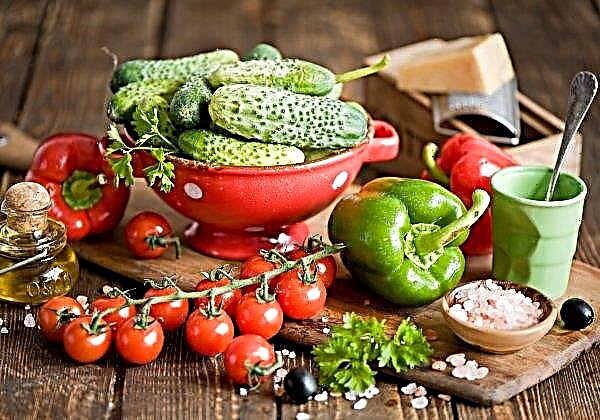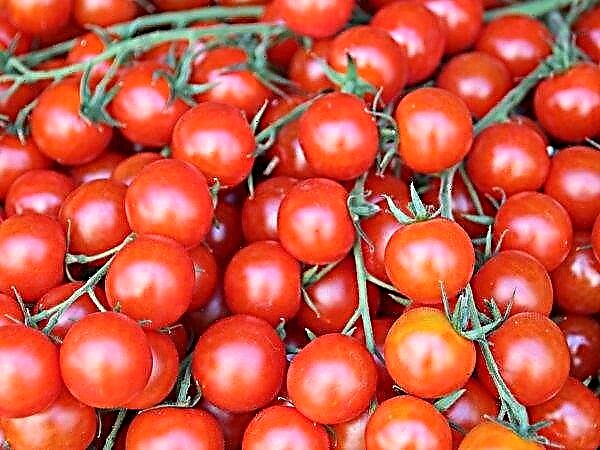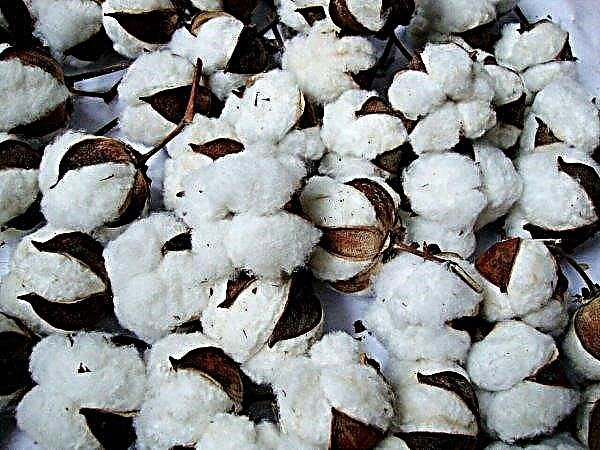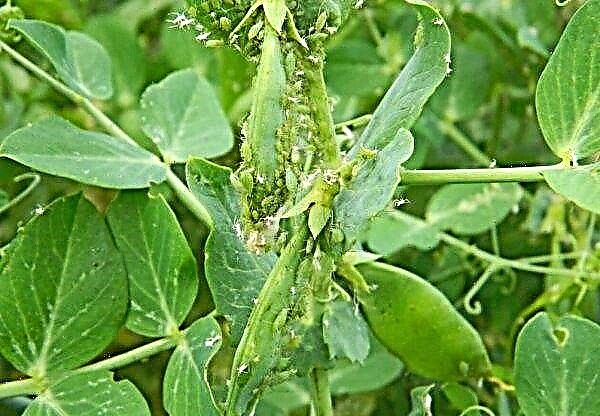Asparagus can not be attributed to the most common food products in our country, but its popularity is growing steadily. And since nursing mothers are especially attentive to their diet, they have a question whether they can eat asparagus, when and in what quantities. These and other nuances will be discussed below.
What is asparagus
Asparagus (lat. Asparagus) is a perennial plant of the asparagus family, found on all continents, most often in dry areas. Asparagus is characterized by a developed root system and significantly branched stems with a large number of branches, similar in shape to needles (cladodes) and collected in bunches in the axils of the leaves. There are many varieties of plants - from herbs to shrubs.
Did you know? Asparagus can grow where other vegetables do not take root - in areas where the soil is saturated with sea water. Therefore, in the soil where it is planned to grow this plant, salt is often added.
The leaves of asparagus are small, immature, with numerous scales or spikes. Flowers are small, regular, bisexual. They can be both single and in thyroid or racemose inflorescences. The main part of the flowers is formed in the axils of the leaves. The fruits of the plant are berries with dark seeds.

The upper shoots (about 20 cm) of succulent shoots of some varieties of asparagus - medicinal, short-leaved, whorled, are mainly used in food. They are a delicacy and are used both for the preparation of delicious dietary dishes, as well as in cosmetology and recipes of traditional medicine.
The youngest asparagus is considered to be the most tender and delicious.. It contains the maximum amount of valuable trace elements and goes well with eggs, bacon and shrimp. In Italian cuisine, it is often used in the preparation of pasta and pizza.
Calorie content and chemical composition
The chemical composition of 100 g of fresh asparagus:
| Vitamins: | Trace elements: |
|
|
Video: Useful Asparagus Properties
| Nutrition value of 100 g of fresh asparagus: | Macronutrients: |
|
|
Did you know? Even in antiquity it was noted that asparagus has a beneficial effect on the functioning of the hormonal system. This is probably why the newlyweds of ancient Greece wore asparagus wreaths. And the festive table of the French newlyweds necessarily included three asparagus dishes.
| Digestible Carbohydrates: | Polyunsaturated fatty acids: |
|
|
| Saturated Fatty Acids | 0.04 g |
What is beneficial asparagus for lactation
- The use of asparagus is of great benefit to women who breast-feed a baby:
- Vitamin A has a beneficial effect on the state of vision and skin;
- Zinc helps to heal wounds and damaged tissues;
- potassium is useful for the cardiovascular system;
- magnesium and potassium help remove excess water and wastes from the body, relieve fatigue;
- nicotinic acid positively affects liver function and prevents vitamin deficiency;
- folic acid helps eliminate hormonal imbalances and avoid anemia;
- shoot fibers improve the digestive system, help cope with flatulence;
- through breast milk - iron, zinc, magnesium contained in the plant, positively affect the formation of bones and connective tissues of the baby;
- regular use of the product prevents the development of osteoporosis, strengthens the bones of a young mother;
- a high concentration of the natural probiotic inulin contributes to the normalization of the digestive tract and creates favorable conditions for colonizing the intestines with beneficial bacteria;
- the plant contains some anti-inflammatory substances and antioxidants;
- low calorie, high fiber and protein helps a young mother to improve digestion and lose weight;
- juices and decoctions of the plant are part of cosmetics and conditioners to strengthen hair.
Important! Trace elements contained in asparagus help the production of dopamine and serotonin, which improve mood and normalize sleep.
Rules for introduction to the diet
Any product in the diet of a nursing mother through milk enters the body of the child, affecting his condition and the functioning of the digestive tract. Therefore, new products, including asparagus should be introduced into the diet graduallyeating a small bite a day. And in any case, do not eat dishes with asparagus more than 1 time per week.
For cooking, only very high quality fresh shoots should be used. The use of canned asparagus, for example, pickled, is highly undesirable. Such a product may be unsafe for the health of the baby.

Rules for use after childbirth
If a young mother breastfeeds her baby, then in the first couple of months of his life, you should stop eating asparagusbecause it increases the risk of indigestion. Shoots can cause flatulence and, due to the high content of mercaptan - a sulfur compound - provoke a sulfuric smell of body secretions.
Respectively, asparagus affects the taste and smell of breast milk, and the baby may begin to refuse food. It should also be borne in mind that these shoots in the diet of a nursing woman can not only increase the risk of upset gastrointestinal tract, but also change the smell of urine in infants.
What time of day is best to eat
It is better to eat asparagus dishes in the morning, after which carefully monitor the reaction of the baby to a new product. With negative manifestations - colic, rashes, indigestion - asparagus should be discarded. And be sure to consult a doctor for further recommendations.
 The most important thing in cooking asparagus is not to “cook” the vegetable, ready-made shoots should be crispy inside
The most important thing in cooking asparagus is not to “cook” the vegetable, ready-made shoots should be crispy inside
It is also better not to use asparagus on an empty stomach, since it can cause intestinal upset both in a young mother and in a baby who is on HB. The digestive organs of newborns are extremely sensitive, so even if a woman does not immediately notice negative manifestations, the baby may experience some discomfort.
Important! Since asparagus is high in potassium, it should not be consumed by those who take blood thinners.
Possible harm and contraindications
In some cases, the use of shoots by nursing women can be harmful.
- So, they are contraindicated in:
- diseases of the gastrointestinal tract;
- the presence of calculi in the urinary organs;
- exacerbation of cystitis;
- joint problems (gout, rheumatism);
- history of allergic reaction to culture.
If a woman suffers from diabetes, the use of asparagus should be discussed with your doctor. And also take into account that the concentration of sugar in white asparagus is higher than in green.
 If you or your relatives have any type of allergic reaction, or if you notice persistent dry skin or persistent prickly heat in your baby, you should be especially strict on diet
If you or your relatives have any type of allergic reaction, or if you notice persistent dry skin or persistent prickly heat in your baby, you should be especially strict on diet
In general, asparagus is an excellent dietary product that has many beneficial properties for the female body. When used properly, the shoots will be a great addition to the daily diet of a young mother and will bring great benefits to both her and her baby.












